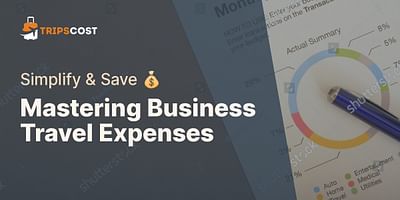Frederik is a seasoned travel author with a penchant for adrenaline-filled trips. He has scaled towering peaks and embarked on thrilling safaris. His passion for extreme sports and wildlife photography fuel his adventurous spirit. When he isn't exploring the world, Frederik can be found playing basketball and immersing himself in intriguing documentaries.
When it comes to business trips, there are several common expenses that you can expect to encounter. These expenses can vary depending on the nature of your trip and the industry you work in. In this guide, I'll walk you through some of the most common business expenses you may encounter on your next trip.
1. Transportation: One of the most significant expenses on a business trip is transportation. This includes airfare or train tickets to your destination, as well as transportation within the city, such as taxis or rental cars. To save money, consider booking your flights in advance or opting for public transportation when possible.
2. Accommodation: Another major expense is accommodation. Whether you're staying in a hotel, a serviced apartment, or a corporate housing option, finding a comfortable and convenient place to stay is essential. Look for accommodations that offer amenities like free Wi-Fi and breakfast to help you save on additional expenses.
3. Meals: Food is a necessity, and while some meals may be provided by your company, you'll likely have to cover some of your own expenses. Keep track of your meal receipts as they may be eligible for reimbursement. To save money, consider dining at local restaurants or using food delivery services instead of expensive room service.
4. Entertainment: Depending on the nature of your business trip, you may need to entertain clients or attend industry events. These expenses can include meals, drinks, tickets to shows or conferences, and even gifts for clients. It's important to set a budget for entertainment expenses and stick to it.
5. Communication: Staying connected is crucial on a business trip, so you may need to budget for communication expenses. This includes mobile phone bills, internet access, and any additional charges for international calls or data roaming. Consider using Wi-Fi whenever possible to avoid excessive data charges.
6. Business-related expenses: Depending on your industry, there may be specific business-related expenses you need to account for. This could include equipment rentals, conference fees, printing and shipping costs, or even professional development courses. Keep track of these expenses and save your receipts for reimbursement or tax purposes.
7. Miscellaneous expenses: Lastly, there are always unexpected expenses that can arise during a business trip. These can include things like laundry services, tips, parking fees, or even emergency expenses. It's a good idea to set aside some extra cash or have a contingency plan in case of unforeseen circumstances.
Remember, it's important to keep track of all your expenses during a business trip. Save your receipts and make note of any business-related expenses for reimbursement or tax purposes. Planning ahead, setting a budget, and being mindful of your spending can help you manage your business trip expenses effectively.
At Trips Cost, we provide comprehensive cost guides and budget tips to help you plan your next adventure, whether it's a business trip or a personal vacation. Check out our website for more information and resources to help you make the most of your travel experience.









